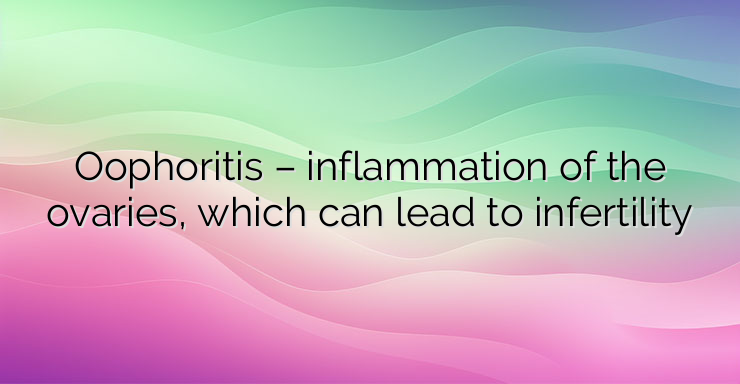Oophoritis is an inflammatory process of the ovaries. The disease can be unilateral or bilateral. It often occurs with simultaneous inflammation of the fallopian tubes, in acute or chronic form. With acute inflammation, there are pronounced pains in the lower abdomen, fever, dysuria and white vaginal discharge. The chronic form is characterized by pain syndrome and menstrual disorders (metrorrhagia). Accumulation of pus in the ovary can lead to pelvioperitonitis. In a long-term prognosis, there is a risk of secondary infertility as a result of ovarian dysfunction. In case of oophoritis, the diagnostic search includes a gynecological examination, ultrasound, hysterosalpingoscopy, bacteriological tests, according to the indications – diagnostic laparoscopy. Inflammation of the ovaries can have a specific character if it is caused by pathogens of gonorrhea, trichomoniasis, chlamydia, mycoplasmosis, tuberculosis and non-specific – if it is caused by conditionally pathogenic microflora (Escherichia coli, staphylococci, candida, streptococci, etc.). Hypothermia, menstruation, childbirth, surgical termination of pregnancy can cause inflammation of the ovaries and its exacerbations, use of intrauterine pessaries, diagnostic and surgical manipulations of the genitals. More often, inflammation of the ovaries develops a second time, as a result of ascending infection from the cervical canal, uterus and fallopian tubes. Less often, pathogens of ovarian inflammation can penetrate into the gonads through blood and lymph (for example, in tuberculosis). With inflammation of the ovaries, the infectious process from the uterine cavity gradually spreads to the fallopian tubes, first affecting the mucous membrane, then the muscular and serous layers. The fallopian tube thickens, lengthens, inflammation leads to the release of pus and the formation of adhesions inside it. Sometimes, with inflammation of the ovaries, pathological changes spread to the surrounding peritoneum (periadnexitis). The accumulated inflammatory exudate can be transparent and form hydrosalpings in the fallopian tube or purulent – pyosalpings, the accumulation of pus in the ovary forms a pyovar. With the further spread of the infectious process, it goes outside the ovary with the development of pelvioperitonitis. Ovarian inflammation can develop acutely, subacutely, and chronically. The acute form of ovarian inflammation is characterized by the following symptoms: Constant, unilateral or bilateral, severe pain in the lower abdomen; Frequent and painful urination; Sometimes abundant purulent and serous vaginal discharge from the genital tract; Fever, general malaise; Sharp pain during sexual intercourse; Bleeding between periods. The periods of exacerbation of chronic inflammation of the ovaries are characterized by: Dull pains in the vagina, the lower abdomen, the groin area, increasing before menstruation, against the background of colds; Disorders of the menstrual cycle, ovarian dysfunction; The presence of scarce,but constant secretions from the vagina; Violations of sexual function (reduced libido, pain during intercourse); Lack of pregnancy despite regular sexual activity without protection. Ovarian inflammation should be treated after a complete differential diagnosis. Therapy of inflammation of the ovaries depends on the stage and course of the disease (acute, subacute, chronic), the reasons that led to its appearance, the nature of the symptoms. References: 1. Cohen A, Almog B, Tulandi T. Hydrosalpinx sclerotherapy before in vitro fertilization: systematic review and meta-analysis. (https://pubmed.ncbi.nlm.nih.gov/29248666/) J Minim Invasive Gynecol. 2. El-Mazny A, Ramadan W, Kamel A, Gad-Allah S. Effect of hydrosalpinx on uterine and ovarian hemodynamics in women with tubal factor infertility. (https://pubmed.ncbi.nlm.nih.gov/26897399/) Eur J Obstet Gynecol Reprod Biol. 3. Kawwass JF, Crawford S, Kissin DM, Session DR, Boulet S, Jamieson DJ. Tubal factor infertility and perinatal risk after assisted reproductive technology. (https://www.ncbi.nlm.nih.gov/pmc/articles/PMC4292839/) Obstet Gynecol.


Leave a Reply